by Vincent Giordano
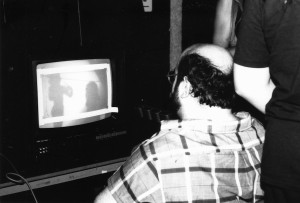
“Memory is a living thing – it too is in
transit. But during its moment, all that
is remembered joins and lives – the old
and the young, the past and the present,
the living and the dead.”
• Eudora Welty
My memories of Ric are not fleeting but fluid and alive. He has always been there, his loud booming laugh rising over everything in the room, the incessant, unquenchable thirst to learn and see every film he could, driving him until his final days. He is there and when he is suddenly gone, the room is no longer the same. Someone once said, “Wherever there is distance, there is longing.” In the empty spaces now, there are only echoes. In the shadows, he dances away unraveling a ribbon of dreams that once were. Our lives are intertwined in so many ways that it is almost impossible to sort him out of the flow of my own life.
The earliest memories that come to me with clarity begin at my grandmother’s house in Brooklyn. That was the focal point of our loud holiday celebrations. Ric lived upstairs with his parents and my grandmother occupied the first floor. It was a large house with a big backyard, driveway and garage. For a young child, it was a great place to roam and discover all the things collected there. It also had a spooky element; I never went into the dark basement alone.
On the Giordano family side, there was Uncle Joe, Uncle Gene, Aunt Lucille and the youngest of the siblings, my father Patrick. I was named after my grandfather who died six months before I was born. He was an elegant spirit to me, only grasped through fragmented stories and fading photographs.
We lived close by in Brooklyn and my parents visited almost every weekend. The close relationship between my father and my aunt and uncle allowed me to stay with them whenever I wanted. This became my second home, and it began my close relationship with Ric. He developed into more of an older brother to me than a cousin.
Most of my cousins had brothers and sisters but Ric was an only child. He did have his faithful dog Candy as his mascot during a good part of his life. My aunt and uncle overindulged him and I in turn benefited because Ric shared with me most of what he had. In the early years, there were file cabinets filled with comic books and monster magazines like Famous Monsters. He was a voracious reader; he consumed material at a furious pace. The influence of the monster movies and comic books was dwindling by the time I began to spend quality time with him and they had little influence on me. It was interesting seeing Ric in the family home movies getting one of the first Great Garloo toys, a popular battery-operated remote control monster from the early sixties, and getting the sense of how much he loved the popular monster figures of the time.
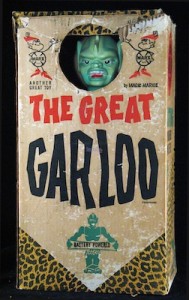

My Aunt Lucille, a former art teacher, encouraged me to draw when Ric wasn’t home or was away at school. She supplied me with tons of pencils and markers of every size and color. There were always reams of colored paper in the downstairs hallway. My Uncle Rich was a truck driver who would often bring home boxes of paper from his route. I would draw for hours and then Aunt Lucille would encourage me to build the elements into a story. I mention this because the process was probably something similar to what she did with Ric when he was young. She took an active interest in everything I was drawing. If she saw I was growing frustrated and kept throwing things away, she would grab them out of the trash and look at them, then try to find something positive about them to keep me going. My aunt was showing me there were endless possibilities and solutions once you were in the creative flow cycle.
Ric had a huge, varied book collection and he was usually reading one or two at a time. If I wanted to borrow or read a book, he would tell me I could borrow it if I could read the first few pages and tell him what it was about. The first time I thought he was kidding and I was a bit lax in my synopsis. He told me I couldn’t borrow the book! The next time I remembered to take my time and really concentrate.
The waning influence of comic books and monster movies in his early teens gave way to Ric’s full blown commitment to a wider spectrum of movies. My clear full memory is of nothing but movies. He went to the movies constantly. I can recall going to the movies with him almost every time I went over to his house. Sometimes we went to two or three movies at a time. My aunt would come with us if my uncle was driving on his route.
Brooklyn was teeming with movie theaters at the time. Some of the theaters were old and opulent and had a great history. Sometimes my best friends older brother would take us with him; other times we’d go by ourselves sometimes sneaking in the side door. I liked that they were in walking distance so I could look inside and see the posters for what movies were coming up. Later, as I got older, we had all the revival houses in Manhattan to go to showing all the classic and foreign films. It was a wondrous time to see and enjoy movies of all kinds. The movie theater holds a special magic for me, even to this day.
If we weren’t going to the movies, or watching movies on television, we would usually listen to music. Ric had a huge collection of soundtracks. His favorite was Ennio Morricone. He would hunt down the daily Italian newspapers and see if they were playing Italian movies in the Italian movie theaters. If so we would go see them. He would have my father, who was fluent in Italian, read or translate anything he didn’t understand. He would also frequent the Italian specialty shops trying to find specific Italian soundtracks that were only released in Italy. If he got a new replacement for a soundtrack, he would give me the old copy so I could listen to it at home. I became very proud of my growing record collection, which I listened to endlessly each day.
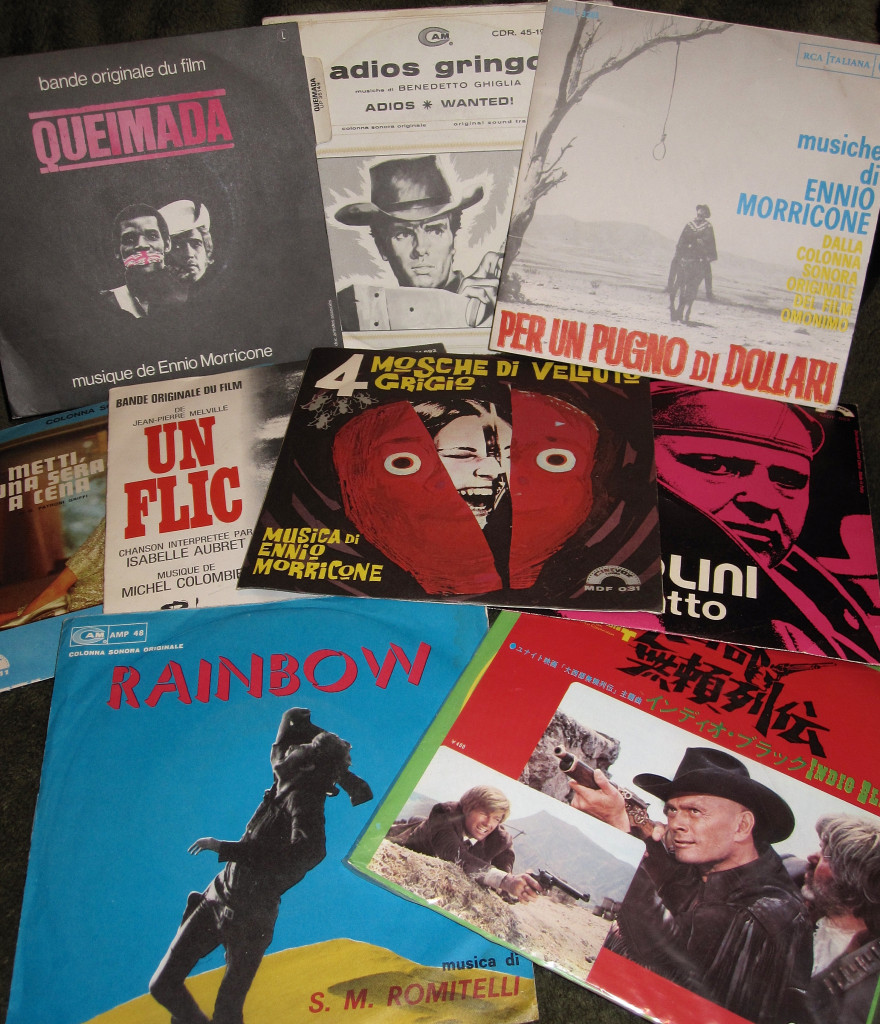
It was interesting, was that so much involved different languages: Italian, Spanish, French and even German. We would always repeat the title in the original language. Ric even watched films in their native language without subtitles. He was so desperate to watch a certain film, he would take it anyway he could get it. Even later in life, when the plethora of films were readily available in different formats, there were certain films that he wanted to see, which were not released here in the US or released unedited or in alternate versions in other countries, and he would often get them in whatever format or language just to watch and study them.
At the time though, he was hugely influenced by the success of the Sergio Leone spaghetti movies. He loved Leone but he had a solid passion and already considerable knowledge of all the classic Westerns. When I told him I really hated John Wayne movies, he made me watch and read everything about John Ford and Howard Hawks. I still didn’t like John Wayne but I learned about John Ford and Howard Hawks.
I think the passion for Westerns came from his father. Uncle Rich consumed television like no one else I ever knew. He did not want to be bothered when he was watching a television show or movie. I think it was truly how he relaxed, but he really loved all the TV shows and movies he watched religiously. He had his own passion for them and his laser-like focus was something Ric obviously inherited from him. Arguments would often ensue when they forced him to come to the table to eat, especially when the movie he was watching wasn’t finished.
About this time, I began writing to many of the people involved in the movies we loved. I got letters back from everyone, from Clint Eastwood to Ennio Morricone. Ric would laugh hysterically every time I got a letter. But my favorite by far was from Eli Wallach. He would write back to me whenever I wrote to him without fail. Ric would send me questions for him to answer and he always would. I continued to write to him for over a decade. There is a huge stack of correspondence somewhere in my house. But what I most loved was the first photo he sent to me, which he autographed all around the sombrero edge.
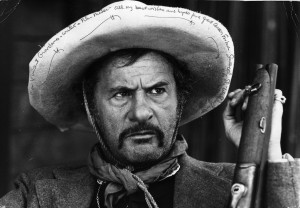
Ric’s entire early life is captured in mountains of slides and 8mm films. He was filmed continually by his parents and relatives. Even as a child, you can see him with the camera chasing my father around. He was a ham and a natural actor at home in front of the camera.

There were also Ric’s filmmaking endeavors with his friends. I remember they got together once to shoot a very elaborate Western. I was very excited to be asked to be in it especially since I got shot and killed. The final product was extremely well done but I moved scratching my nose when I was supposed to be dead. Ric always brought that up whenever he showed the film, and he showed it a lot so I never heard the end of it.
When I saw them shooting with the 8mm and Super 8mm film cameras I immediately knew what I wanted to do. It was all very exciting, creating the shots and putting it all together. I got a cheap Kodak fixed lens Super 8mm camera from my parents and I began experimenting on my own. Later, the local mobster who lived across the street from us, got me a new camera when my old camera broke. I remember it was the first time I heard the term, fell off the truck. I was like I don’t want a broken camera. I was a bit baffled but overly delighted that the camera worked so well.
In my endless letter writing campaign, I sent my films to Bob Fontana, who was running a small filmmaking group in Carrol Gardens in Brooklyn. He came out to my house to talk with me and Ric, extremely impressed with our films. Bob offered to help out with film stock, processing, and additional better cameras to continue our work. So we made one or two more films with his help.
Ric focused less on making films in the coming years and more on his writing and his film studies when he entered NYU as an undergraduate. I had a long while to go before I got to college but Ric’s enthusiasm for it certainly pointed me toward going as well, even when I was young.
Our cousin Robert Giordano took his childhood passions for photography, drawing and painting and earned a BFA in photography and graphic design before coming to New York to earn his Masters degree in film at NYU. So he was essentially the first to go for his degree in Film in our family. Robert was mentored by Beda Batka, the cinematographer who shot the legendary black and white film, Marketa Lazarova, and eventually offered a fellowship. It was at NYU that Robert and Ric finally reconnected.
I didn’t see Ric as frequently when he was in college. I was entertaining my own interests and following my own pursuits. Ric had also explored acting while in college, taking acting classes and appearing in several plays. I did go see him in Guys and Dolls and I was impressed with his performance. I remember him diligently rehearsing and it was the first time I saw his deep focus momentarily moved off film. He was growing in many different directions. The narrative line for his NYU years is eloquently captured by his close friends, including Mel Neuhaus; their insights illuminate that chapter of his life well.
Ric and I did manage to squeeze in going to see some of our favorite movies from time to time. I saved program notes from most of them. We went to see the Art of the Twenties: Film from the Archive series in 1980 at the Museum of Modern Art and went to see Lang’s Metropolis and Von Stroheim’s Greed a few days apart. We would follow the different versions of Metropolis through the years and marvel at each reconstruction. Ric and I both loved Fritz Lang. One of the most memorable times was going to see Lang’s colorful Indian Epic films together. He was like a kid, so enthralled with the screen, watching both The Tiger of Eschnapur and The Indian Tomb back to back.

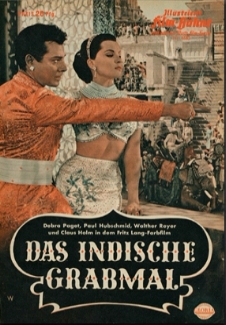
I bought the two DVD box set of the films two weeks before Ric passed away. He wanted a copy of them immediately. Ric was so delighted when I got them to him. When I was given his computer case in the emergency room, I opened it and the two DVDs fell out. I don’t know if he got to watch them but I hope he did.
One of the key things to me was how much Ric enjoyed watching and discussing movies. He went to each one, even in his final years, with the same excitement and enthusiasm. I never saw him taking notes and rarely did he ever take his eyes off the screen whether it was big or small. He was able to retain each film he viewed as if each one was burned into his mind. I never met anyone who really had that exacting deep recall for movies. It was often staggering how a small description, a piece of dialogue or a visual could help him rapidly identify a film. But to me it came down to his unquestioning, unbridled, pure love of film. It was a devotion that was never marred by any internal or external doubt or static.
When it came time to choose a college I applied to the top Los Angeles and New York film schools and was accepted by all of them. I had decided that I wanted to focus on making films, and that film scholarship would remain Ric’s domain. He was the greatest teacher and mentor one could have in that regard. My decision also reflected a path that I decided on for myself. I not only wanted to understand film but to have a full life traveling throughout the world and understanding other cultures. Most filmmakers are stuck using reference points from other movies rather than life and I didn’t want to be limited in that capacity.
Ric told me in the summer before college to look at the boards in the colleges so I could get jobs apprenticing and working on actual films. This was the best advice one could get, even today. During the first year of college, I started working at a small editing house that also did their own productions.
One afternoon I ran into Francois Truffaut and his lady friend on the street. I was carrying my dog-eared copy of Truffaut/Hitchcock in my bag. When I approached him, he couldn’t have been more rude and egotistical, so much so that I have to say in all my years in the film business I have never met anyone as rude or obnoxious person as him. I was a bit startled and just walked away baffled by his actions.
I immediately called Ric to tell him about what happened but he didn’t listen very long before exclaiming, “Figures! Makes total sense. Who cares about him.” Ric was then off on another topic signaling that was the end of the conversation. I feel nothing personal against Truffaut; it was my own youthful naivete about people in the industry that led to my disappointment.
It made me laugh hysterically though when Ric was interviewed about the making of LL Cool J’s video Going Back to Cali and he brought up Truffaut once again, “Going Back to Cali was supposed to look like a French New Wave film, 1960’s art house cinema. Not Truffaut, I hate Truffaut, more Claude Chabrol, Godard, Antonioni. Also a little Fellini-I watched 8 ½ and stole two shots from that…”
A year or two later, I would work with the late great Director of Photography Nestor Almendros. When I was first called to go meet him, my first thought was of Truffaut. Nestor had shot a number of Truffaut films. I anticipated the worst simply by association. One day, out of the blue, Nestor while waiting on a shot set up, turned to me, and said, “I hope you are not disappointed. Sometimes when we meet the people we respect and look up to we find they are not what they seemed to be.“ I thought nothing was further from the truth but I felt it was time to relay my Truffaut story. Nestor just laughed and remarked that Truffaut could come across that way at times but at heart was a good person.
My one negative situation redeemed itself weeks later when I was dashing up 57th Street to meet a friend. A tall, figure stumbled out of the Russian Tea Room with his friends. He was loud and brash as he said goodbye to some business associates. When I got closer I realized it was John Cassavetes. I was startled when he turned to me and I just about blurted out “hello” before he grabbed me in his arms and gave me a big hug. I felt like I knew him for years in that short instant.
John spoke directly with great passion. He told me to follow what was inside me, to work at expressing it through the techniques I was learning, to keep working at it no matter what. I asked if I could send him one of my scripts and projects and he said “yes” immediately. He scribbled his name and address and told me though he was always busy and maybe couldn’t get back to me, he would look at it. In an instant, he hugged him, said goodbye and was gone down the street. I felt so energized I couldn’t even speak, but I had to tell Ric.
I showed him the paper with John’s address and he took it from me. He was so excited about it that I actually never asked for it back and let him have it. It didn’t matter. By giving me that small talk and trusting me with his address he gave me all the faith and belief that was needed. He infused people with the passion to drive ahead no matter what the obstacle.
A short time later, I won with the help of Ric, my friends writer/director John Gray and Jeff Kleiser, the American Film Institute Independent Filmmaker Grant. In doing so I became, along with John, one of the youngest winners and the first in my college’s history. The film didn’t turn out as well as planned, but I learned several valuable lessons from it and finished another two films that were closer to who I was and what I wanted to express, and did so before graduating. The value of college for me was the safety net to explore and the building of a network of true friends and colleagues that carried me throughout my career. Such friends as the late Harris Savides, Michael Garfalo, Tony Martinez, Darryl Holmes, Victor Mulholland, George Seminara, Eugene Allen, John Mariano and a host of others would be part of my production world for years to come and many would become close friends of Ric as well.
During and after our college years, Eugene Allen and I would often go to see his Aunt actress Nancy Allen in the village. She was always very gracious to us, talking movies, inspiring us, and generally offering whatever advice she could to help us along. Nancy lived close to Weinstein so when we left there our first stop was to go see Ric, now known as Mr. Ric, at Weinstein Hall where he worked as the night desk person. There were some nights that we couldn’t even get close to Ric. It was nothing short of insane the amount of people around his desk, asking questions, handing him papers or generally talking movies. He was like a king holding court every night.
The next challenge for me was to go into the Masters program or create my own film production company upon graduation. The money was just about in place for the company so I again sat down with Ric to talk it over. Ric had been pursuing his Masters Degree but felt the idea of teaching was losing steam with him. He decided to let go of his pursuit of the advanced degree, though a few credits short and was working nights to pay off his college bills. Ric told me to pursue production if that was what I wanted to do.
Two months later, we established our first production company in Kaufman-Astoria studios. Ric was active part of the company and began writing profusely during this period. We burned out three feature screenplays in a matter of months. People think the story begins with Def Jam and Rick Rubin but it was long in the making before his arrival. Ric was actively writing and creating at a feverish pace.
A year went by and there was tension between the investors who wanted to steer the company one way and us who wanted to move in another. Things were deteriorating rapidly. Ric said he had a project in the works with someone who had a record company. I had other projects that I felt we could push for the time being. We were at a crossroads after so much hard work. But a big change was right around the corner.
The funny thing about memory is that certain things stick regardless of whether you think about them much or not. Even though Ric bypassed being a teacher, in essence, that was what he was doing all along. He educated people about film. His enthusiasm was infectious. The indelible image of Ric sitting behind the Weinstein desk loudly discussing some director or film was an integral part of his makeup and he repeated it in many different intervals of his life. People were listening and being inspired. He had that special spark to inspire, which Cassavetes had.
Although Ric is gone, the image of him holding court again somewhere with all the usual people all around him remains indelible. In this moment, he is truly happy. The job had nothing to do with it; it was just a paycheck, he was surrounded by people with a passion and thirst much like his own. They are talking movies. What else is there? I really want to hear all the interesting conversations but it’s getting late and I have to go. Somewhere those conversations continue now with all the movie people he knew and loved. I want to listen and hear his voice but it’s not my time yet. But, I know that I see him again he’ll catch me up on everything like we did so many countless times in the past.
End of Part One.
Story and Photos ©2014 Vincent Giordano. Unauthorized use and/or duplication of this material without express and written permission from the author is strictly prohibited.